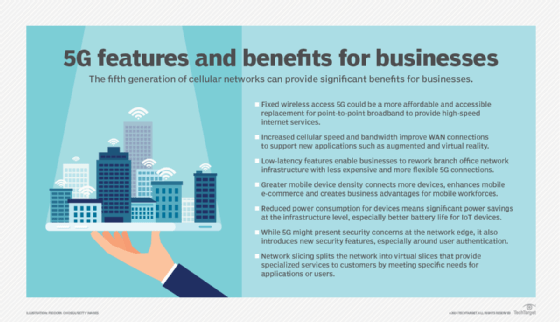
ake78 (3D & photo) - Fotolia
Decision-makers may prefer Wi-Fi over 5G in retail networks
For retail use cases, 5G may not provide as many benefits as it would for other sectors. Yet 5G offers innovative features, and retailers may still adopt 5G networks in the future.
While fifth-generation wireless has taken the technology world by storm, many retailers don't see a need to heed the hype.
Several use cases may glean immediate 5G benefits, yet 5G in retail is superfluous for now. Although 5G can support retail networks that require advanced capabilities, such as virtual reality, the retail world won't depend on 5G because other wireless technologies are still efficient, according to a recent Forrester Research report. The report "The CIO's Guide To 5G In The Retail Sector" explored particular retail use cases, and report author and principal analyst Dan Bieler discussed key differences between retail and other 5G use cases.
"Retailers are quite sophisticated in their existing technology understanding," Bieler said. "They have achieved some great solutions with existing technologies, and they will not risk upsetting everything in the short term where they don't see a clear [ROI] for making additional network infrastructure investments in 5G."
 Dan Bieler
Dan Bieler
Retailers are interested in 5G for their networks, Bieler said, yet few have implemented or deployed 5G so far. Some retailers may seek out 5G as a replacement for existing MPLS connectivity, but this choice depends on pricing models and business requirements. Overall, IT decision-makers may prefer Wi-Fi over 5G in retail networks because not all retailers require the advanced capabilities 5G networks offer, he added.
5G in retail lacks transformative qualities largely because cellular technologies weren't developed for indoor network coverage, and physical objects indoors can impede 5G's millimeter wave frequencies and its line-of-sight travel capabilities.
The advent of Wi-Fi 6, or 802.11ax, may interest retailers more than 5G, as Wi-Fi historically supports more indoor use cases and networks than cellular technologies. Both Wi-Fi 6 and 5G offer similar capabilities, which makes them competitors in some use cases and complementary in others. For exclusively indoor retail environments, IT decision-makers may not see a need for 5G networks, Bieler said.
"[Retailers] can do a lot with the technologies that we have today," he said. "5G will be a continuum rather than a completely revolutionary new technology for them."

Another issue retailers could face regarding 5G is customer apprehension. Despite 5G's various new capabilities, customers don't necessarily care about technological innovations and won't alter their shopping habits because of 5G. However, customers in younger age groups may be more willing to adapt to the capabilities 5G enables, so organizations should focus more on how to win over older age groups, the report said.
Benefits of 5G in retail use cases, networks
Despite the efficiency of other wireless technologies, the report noted three main areas where 5G in retail can benefit business operations, including the following:
- Back-end operations, where organizations can handle work the customers don't see, such as tracking and monitoring inventory within warehouses.
- Front-end operations, which are customer-facing operations and deal with tracking and monitoring products and people within stores.
- Finance operations, where the store can remotely track and monitor a customer's product or service usage and charge them accordingly.
As 5G rolls out throughout the 2020s, more features and potential benefits for organizations will arise, such as network slicing and mobile edge computing. These capabilities can help organizations create experiences tailored specifically to individual customers.
"5G allows the retailer to track many more items and many more sensors in a store than previous cellular technologies, so they can have a much more granular picture of what retail customers are looking at, where they are going and what they are doing with products in the store," Bieler said.
Other benefits the report cited include cost-efficient store connectivity, enhanced customer insights and improved transparency within supply chains. Organizations won't glean these benefits for several years, Bieler said, as carriers will deploy new 5G features in stages.
However, decision-makers can prepare to deploy 5G in retail use cases by focusing closely on network design and determining whether 5G is the right choice for their operations. To evaluate this, organizations can assess their indoor connectivity environments and gauge how a 5G deployment could affect the business sectors in which the store or organization requires 5G access.
Overall, 5G has various benefits for retail use cases, the report said, but these benefits are not universal. Businesses need to look closely at their network infrastructures and business requirements to evaluate 5G's potential effect on their operations. Regardless, Bieler said he was sure deployments of 5G in retail will eventually become common.
"[Retailers] will still adopt it over time because 5G will provide super-fast broadband connectivity," Bieler said. "It opens up your business model opportunities in an easier way. So, over time, retailers will definitely embrace it, but not tomorrow."






